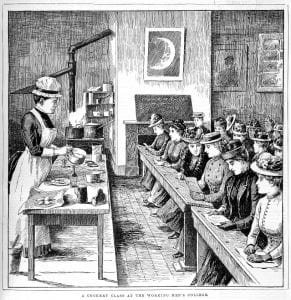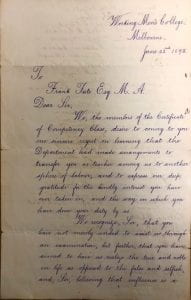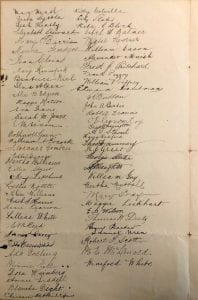The Frank Tate Diaries
Sophie Russell

Frank Tate, born 18 June 1864 near Castlemaine, Victoria, was one of Australia’s most esteemed educators of the 19th and 20th centuries. After discovering a talent for teaching as a pupil-teacher at the Old Model School on Spring Street in Melbourne in 1877, Tate began a hugely successful career in teaching that led to his appointment as the first Director of Education in 1902. Frank Tate was critical of the education system that he inherited, a system that included a narrow curriculum, low teacher training, low teacher salaries and the ‘payment by results’ system of remuneration. As a founding member of the State School Teachers Union of Victoria, Department of Education inspector, a key contributor to the Theodore Fink Royal Commission into technical education, and as Director of Education Tate lobbied for the introduction of ‘new education’ and reform in Victorian schools. Tate’s educational reforms introduced a more liberal and creative approach to education, with the inclusion of literature and poetry into a curriculum that had previously been defined by wrote-learning and strict discipline. Tate was vocal about the under-resourced and under-funded plight of rural Victorian schools, and believed that all Victorian children should have equal access to a well-funded and well-taught public education. Tate has been recognised by colleagues and students as a man of wit and charm, who frequently quoted Shakespeare, and who fostered a sense of dignity among the undervalued teachers of Victoria.
Tate’s impact on education also drew international recognition. In 1919 he was appointed a CMG and in 1927 a chevalier of the Legion of Honour. Tate was also invited to London for Imperial Education conferences in 1923 and 1927, and travelled to New Zealand (1925), Fiji (1926) and Southern Rhodesia (1929) on educational business. Tate’s international travels in retirement to the United States, Canada, New Zealand, Samoa and England, among others, are eloquently documented in the Frank Tate diaries, although these musings are laden with nostalgia for the Australian landscape and continuing reflections on education. Frank Tate passed away on 28 June 1989 in Melbourne, leaving behind the legacy of a lifetime’s commitment to improving education for the students and teachers of Victoria.[1]

TEACHERS LEGACY
A Thank You Card to Victorian educator Frank Tate from Working Men’s College Melbourne students [2]
Among the letters, accolades, newspaper clippings and bound diary entries that detail the life of Frank Tate (1864-1939), one document emerges as a charming tribute to his impact as an educator.


The document is a folded handwritten letter, slightly larger than A4, and can be better described as a large card. With writing on the front cover that continues on the inner right page, the card is compiled by students from the Working Men’s College of Melbourne, the predecessor institution to RMIT. The Working Men’s College, funded by unions and workers, was established in 1887 and provided the historically significant opportunity for working-class people to obtain a tertiary education. The College was hugely popular, attracting 2000 students in the first two years instead of the predicted 400 after it opened in 1887.
Authored on June 22nd 1895, the card details a thoughtful letter from the students of a ‘Certificate of Competency Class’ that laments the impending departure of their lecturer, Frank Tate, who at 31 years old had been appointed Inspector of Schools on 1 July 1895. Following expressions of gratitude and well wishes, the card contains on its inner left and lower right pages a list of seventy-seven individually signed names.
Much like the surreptitious organisation of a colleague’s birthday card from the office, this document bears the quaint hallmarks of a group effort to collate a touching parting gift for a well-loved teacher. The paper is slightly thicker and of stronger quality than most other documents in the Frank Tate collection. The paper contains a faint sheen from decorative horizontal lines. The blue inked main body of text is meticulous, uniform and error free, indicating a carefully planned or perhaps pre-drafted effort. Faded ruled lines are still slightly visible, both underneath and beside the main body of text to designate strict areas for signatures. In contrast, the signatures themselves are as diverse in style as the seventy-seven people who authored them, both men and women mostly in their early 20s. Slightly smudged impressions of names can be found on the opposing pages of the card, suggesting a pre-emptive folding of the paper before the ink was dry (Quick! Hide the card before Professor Tate arrives!) The presence of female names is also notable, as the somewhat erroneously named Working Men’s College had started admitting women to technical, business and arts courses seven years prior in 1888, almost immediately after it opened. Indeed, at least one 22 year old student signatory, Alice Bessie Edgoose, became a teacher herself, as a pupil teacher at Mitcham and later at Fairfield State School.

The text itself speaks to Frank Tate’s renowned approach to education and educational reform. The students remark that beyond preparing them for examinations, Tate ‘aimed to have [them] realise the true and noble in life as opposed to the false and selfish,’ and that Tate’s influence was ‘of such a character that, when [he is] finally transferred, [he] shall have left [his] foot-prints on the sands of time.’ Frank Tate would go on to serve as Director of Education in Victoria, receive the Legion of Honour and introduce educational reform to secondary schools and tertiary education. Beyond the prestige and accolades from a lifetime’s service to education, this document features perhaps the most important legacy left by our teachers – appreciative and inspired students.
Sophie Russell is a PhD Student in the department of Classics and Archaeology at the University of Melbourne. Her research explores the digitization of archaeological and cultural heritage sites in modern conflict zones.
Transcript of letter to Frank Tate from Students at Working Men’s College Melbourne, 22 June 1885
Working Men’s College, Melbourne,
June 22nd 1895.
To Frank Tate, Esq. M. A.
Dear Sir,
We, the members of the Certificate of Competency Class, desire to convey to you our sincere regret on learning that the Department had made arrangements to transfer you as teacher among us to another sphere of labour, and to express our deep gratitude for the kindly interest you have ever taken in, and the way in which you have done your duty by us.
We recognise, Sir, that you have not merely worked to assist us through an examination, but further, that you have aimed to have us realise the true and noble in life as opposed to the false and selfish, and, Sir, believing that influence is a most important factor in life, we are glad to think, that the influence you have exerted over us, which we in turn strive and shall strive to exert over thousands of the rising generation, has been of such a character that, when you are finally transferred, you shall have left your foot-prints on the sands of time.
We trust, Sir, that in new fields the work, which is so dear to you, will be prosperous and appreciated by those whom it is for.
Wishing you and yours every true happiness and prosperity,
We are,
Dear Sir,
yours gratefully,
On behalf of the members of the above class.
[signed by 77 names]
References
[1] R. J. W. Selleck, ‘Tate, Frank (1864–1939)’, Australian Dictionary of Biography, National Centre of Biography, Australian National University. http://adb.anu.edu.au/biography/tate-frank-8748/text15325
[2] University of Melbourne Archives, Frank Tate (1895-1934), 1999.0031, Letter from students of the Working Men’s College Melbourne to Frank Tate, 22 June 1895.
For more information on the life and legacy of Frank Tate
Anchen, J. O. (1956) Frank Tate and his Work for Education. Melbourne: Australian Council for Educational Research.
Leave a Reply